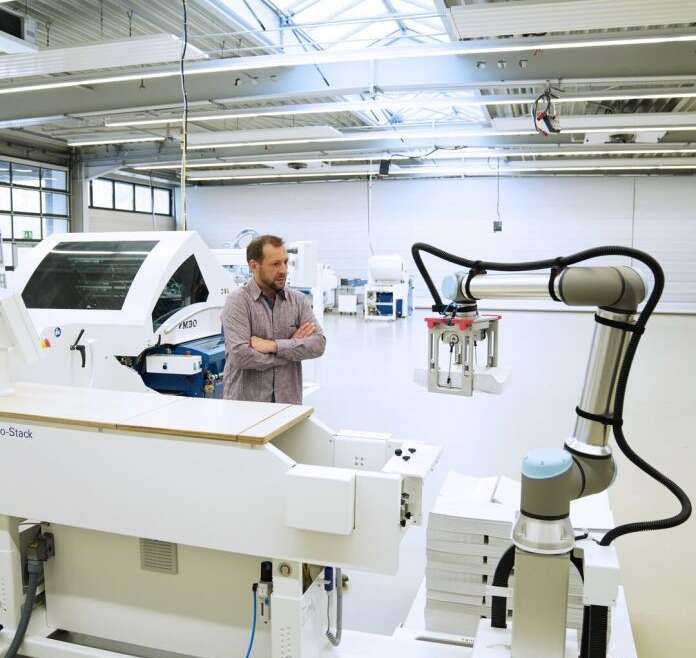Misconceptions persist as workers still view advanced automation as a threat to their jobs. However, James McKew, Regional Director Asia-Pacific at Universal Robots, believes this couldn't be further from the truth.
 James McKew, Universal Robots regional director for Asia Pacific.
James McKew, Universal Robots regional director for Asia Pacific.
“The proof is in the name,” he says.
Collaborative robots, affectionately called cobots, work safely with people and, as the name suggests, everything revolves around collaboration.
“Cobots are not a threat to human labor, they help improve the quality of production and the way humans and robots work together,” he adds.
An (ir) rational fear
According to McKew, the fear of being taken over by robots is natural. However, he says that Universal Robots was founded on "Empowering People" and the transition from "People who work like robots" to "People who work with robots".
When some think of robots, they think back to those in the movies. In the manufacturing environment, however, "their purpose is to guide people who are able to manage production processes and get them to manage robots that do the boring, dusty, monotonous and non-creative aspects of production processes."
He adds that cobots shouldn't be confused with industrial robots. "Cobots are designed to be people-friendly, have systems on board that can recognize people, and they don't have to be locked up."
“Cobots do not harm people, but industrial robots do. They are simple to use, easy to program, and lightweight. In fact, even operators with limited programming skills can become cobot programmers, ”he explained.
As usual
Now, in a time of ongoing lockdowns, border closings, and heightened health and safety concerns, cobots enable business as usual – even in the unprecedented times.
Add to this the reliance of local manufacturers on a global supply chain who are converting their production to bring production home and ensure business continuity.
“Cobots act as the lifeline for local businesses that need to speed up local manufacturing. Cobots ensure increased productivity, fewer errors and improved efficiency. "
In addition, cobots enable production workers to master robots and train cobots to do the boring and monotonous jobs that talented and skillful people shouldn't be doing.
With an aging manufacturing population and fewer young people looking to do manual factory jobs, cobots are helping to transform this space into a more attractive work environment for the younger workforce.
"You now have the opportunity to program and manage cobots, which makes manufacturing a desirable career choice for the future."
What the future brings
Mr. McKew sees robot cell operators who improve processes and create added value for human-machine operators.
He explains that many machines can be managed by multiple cobots, while one person is responsible for managing all of these tasks.
"You program them, optimize them and determine whether there are more creative ways to use the cobots to increase production output."
According to McKew, Universal Robots is on the way to "turning people who work like robots into people who can control robots themselves".
The opportunities for countries to resume production are immense. The pandemic has taught countries that strategically outsourcing all production isn't very strategic.
"Cobots together with talented manufacturing workers offer companies enormous opportunities for efficient reshoring in the post-pandemic world," he concludes.
Would you like to learn more?
From November 9th to 10th, Universal Robots will once again host the largest exhibition for virtual collaborative robots (Cobot) in the Asia-Pacific (APAC) region – Collaborate APAC – Cobot Expo. This year's theme is titled “Collaborate” and will introduce some of the company's prominent global speakers in an informative panel discussion.
Register for the live event at universal-robots.com/sg/collaborate-apac-cobot-expo-2021.
About Universal Robots
Universal Robots (UR) was founded in 2005 to make robotic technology accessible to all by developing small, easy-to-use, affordable, and flexible collaborative robots (cobots) that can safely work side-by-side with humans. Since the introduction of the first cobot in 2008, the company has seen significant growth with the easy-to-use cobots that are sold around the world today. The company, which is part of Teradyne Inc., is headquartered in Odense, Denmark, and has regional offices in the USA, Germany, France, Spain, Italy, Great Britain, Czech Republic, Poland, Hungary, Romania, Russia, Turkey, China, India, Singapore, Japan, South Korea, Taiwan and Mexico. In 2020 Universal Robots had sales of $ 219 million. You can find more information at universal-robots.com.




